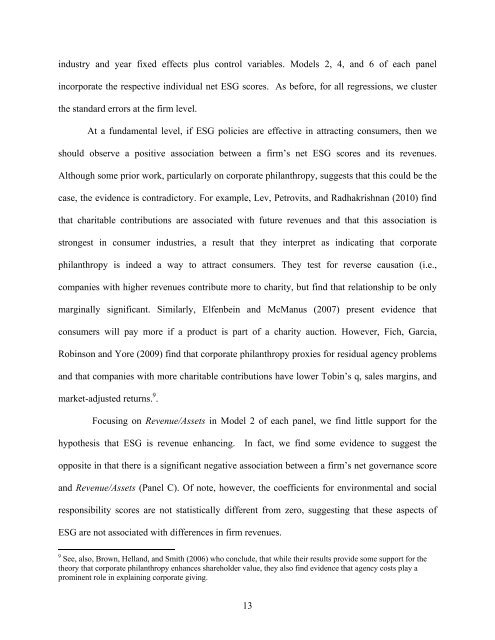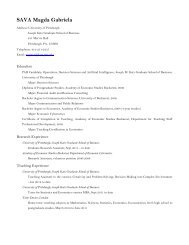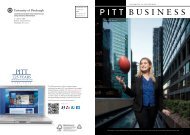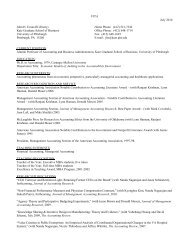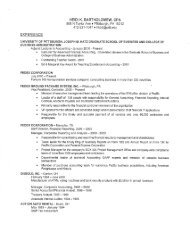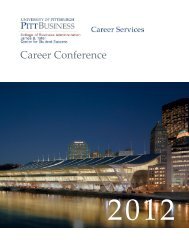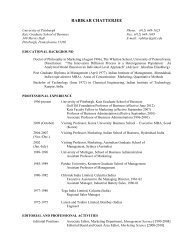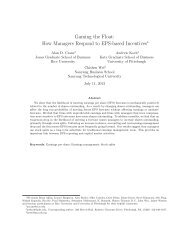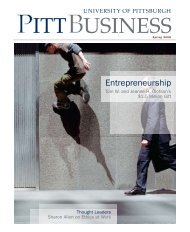Stuart L. Gillan, Jay C. Hartzell, Andrew Koch, and ... - Pitt Business
Stuart L. Gillan, Jay C. Hartzell, Andrew Koch, and ... - Pitt Business
Stuart L. Gillan, Jay C. Hartzell, Andrew Koch, and ... - Pitt Business
You also want an ePaper? Increase the reach of your titles
YUMPU automatically turns print PDFs into web optimized ePapers that Google loves.
industry <strong>and</strong> year fixed effects plus control variables. Models 2, 4, <strong>and</strong> 6 of each panel<br />
incorporate the respective individual net ESG scores. As before, for all regressions, we cluster<br />
the st<strong>and</strong>ard errors at the firm level.<br />
At a fundamental level, if ESG policies are effective in attracting consumers, then we<br />
should observe a positive association between a firm’s net ESG scores <strong>and</strong> its revenues.<br />
Although some prior work, particularly on corporate philanthropy, suggests that this could be the<br />
case, the evidence is contradictory. For example, Lev, Petrovits, <strong>and</strong> Radhakrishnan (2010) find<br />
that charitable contributions are associated with future revenues <strong>and</strong> that this association is<br />
strongest in consumer industries, a result that they interpret as indicating that corporate<br />
philanthropy is indeed a way to attract consumers. They test for reverse causation (i.e.,<br />
companies with higher revenues contribute more to charity, but find that relationship to be only<br />
marginally significant. Similarly, Elfenbein <strong>and</strong> McManus (2007) present evidence that<br />
consumers will pay more if a product is part of a charity auction. However, Fich, Garcia,<br />
Robinson <strong>and</strong> Yore (2009) find that corporate philanthropy proxies for residual agency problems<br />
<strong>and</strong> that companies with more charitable contributions have lower Tobin’s q, sales margins, <strong>and</strong><br />
market-adjusted returns. 9 .<br />
Focusing on Revenue/Assets in Model 2 of each panel, we find little support for the<br />
hypothesis that ESG is revenue enhancing. In fact, we find some evidence to suggest the<br />
opposite in that there is a significant negative association between a firm’s net governance score<br />
<strong>and</strong> Revenue/Assets (Panel C). Of note, however, the coefficients for environmental <strong>and</strong> social<br />
responsibility scores are not statistically different from zero, suggesting that these aspects of<br />
ESG are not associated with differences in firm revenues.<br />
9 See, also, Brown, Hell<strong>and</strong>, <strong>and</strong> Smith (2006) who conclude, that while their results provide some support for the<br />
theory that corporate philanthropy enhances shareholder value, they also find evidence that agency costs play a<br />
prominent role in explaining corporate giving.<br />
13


